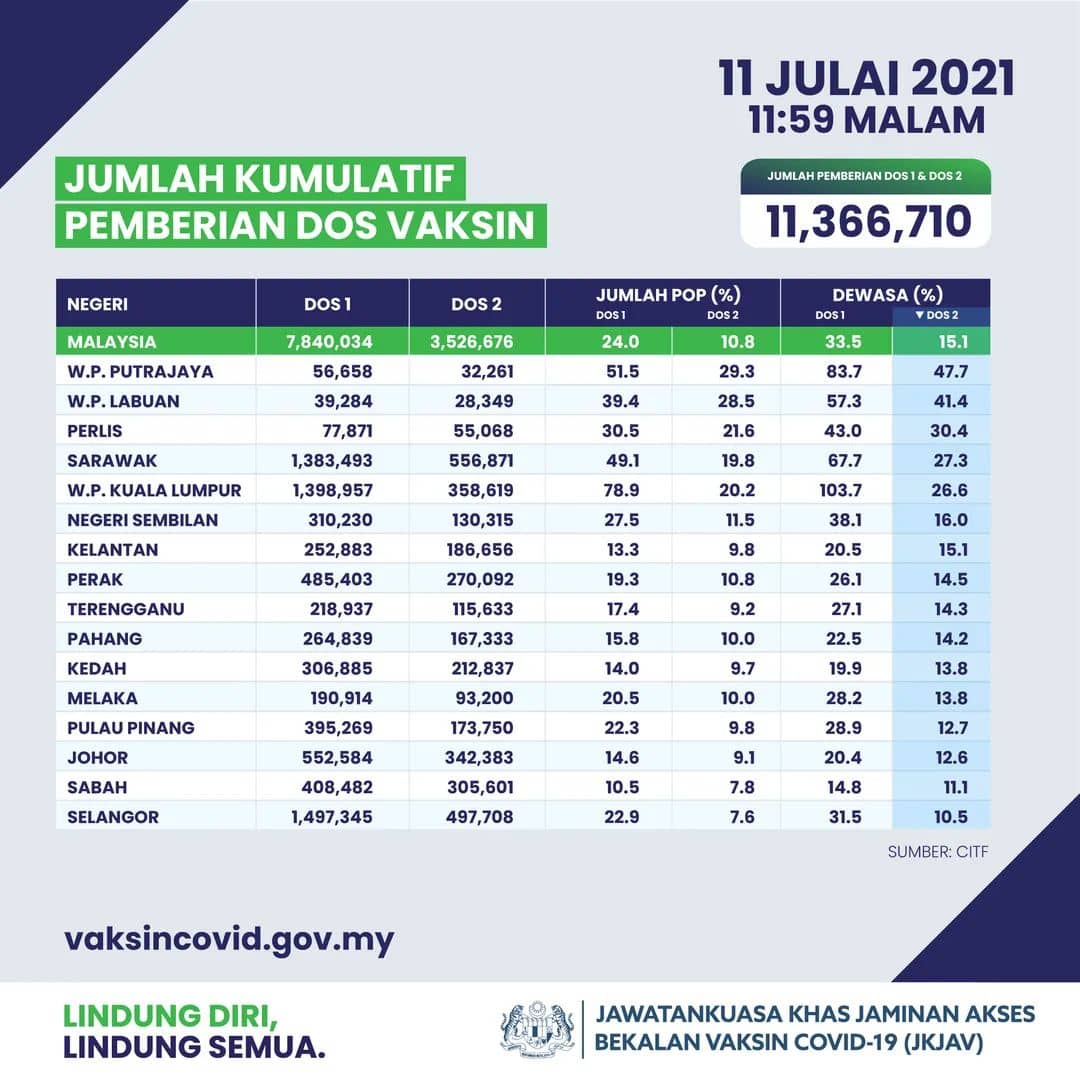Failure is not an option in Malaysia’s fight against Covid-19

Contrary to the idea that Malaysia is a failed state, the country is making progress on vaccinations and has an array of financial and food programmes to help those in need
By Tengku Zafrul Aziz for The Straits Times
Malaysia, like many other countries in South-east Asia, is battling a surge in Covid-19 infections, driven in part by new highly infectious and deadlier variants.
The challenges to public health have also caused economic distress and a less-than-ideal domestic political climate.
Its present difficulties have prompted an unfair assessment that Malaysia is becoming a “failed state”. This notion, however, suffers from four serious flaws.

First, claims that Malaysia is in danger of becoming or has already become a failed state conveniently ignore the government’s success in ramping up its vaccination rates, which are key to recovery.
Most recently, our vaccination rate has consistently surpassed 300,000 doses daily. In fact, Bloomberg’s Covid-19 Vaccine Tracker clearly shows how Malaysia’s vaccination rate has dramatically improved – it will now take a mere five months to immunise 75 per cent of its population, compared with the estimate of 4.5 years made in April.
To date, 3.1 million people, or more than 10 per cent of Malaysia’s adult population, are fully vaccinated.
According to the World In Data Covid-tracking site, Malaysia is currently among the world’s leading countries in terms of daily jabs administered to every 100 persons in the population, surpassing countries such as China, Britain, France and Germany on July 10.
Now that sufficient supplies are finally reaching our shores, we are pulling out all the stops and partnering with state governments, the private sector and civil society on mass vaccination.
Based on this alone, no journalist worth his salt would label a government, which is on track to ensure 80 per cent of its adult population are vaccinated by end-2021, as moving towards failed statehood.
National recovery plan
Second, if the opinion was truly evidence-based, one would not have missed Malaysia’s recently announced National Recovery Plan (NRP), which is a clear, dynamic plan relying on real-time data to track crucial threshold values in ensuring a systematic exit from the pandemic.
The plan relies on three key indicators, namely the Covid-19 transmission level in the community, the public healthcare system’s capacity to respond and the vaccination rate of the population.
These indicators with specified targets have not only been clearly stipulated to enable the safe transitioning from one phase to another, but have also been translated into state-level targets to empower the 13 states in Malaysia to manage those threshold values within their own jurisdiction.
To date, seven states have already met the targets, one of which is having more than 10 per cent of the adult population fully vaccinated, enabling them to move to phase two of the NRP, which entails the opening of more economic sectors.
The challenges of managing the pandemic are greater now, given the more aggressive Delta variant, which has wreaked havoc in South-east Asia. Hence, our more aggressive strategy that includes enhancing lockdowns in hot spots and increasing targeted testing.
Meanwhile, in responding swiftly to localities with a spike in cases, such as Selangor and some parts of Kuala Lumpur, stricter lockdown is paired with a robust vaccination and testing strategy over a two-week period.
Intensive care unit capacity is also being raised in partnership with private hospitals, while more public, teaching and army hospitals have been re-designated as Covid-19 hospitals in the Greater Klang Valley. This is a targeted, hyper-focused strategy to optimise resources based on facts and data.
Community care campaign
Third, references to the “white flag movement” as further (and perhaps social media-based) evidence of impending failed statehood not only miss the point that democracy is alive and well in Malaysia, but also completely fail to appreciate the historical context and socio-political psyche of the Malaysian masses.
I am sure that many social and political scientists are as baffled as I am by how a single community-care campaign (and perhaps also social media conversations) on helping those in need can be equated with impending failed statehood.
The facts are clear: Despite being burdened with legacy debt and socio-economic structural issues, as well as political uncertainty, RM38 billion (S$12.2 billion) was successfully disbursed in the form of direct aid and subsidies last year, while RM45 billion has been allocated for this year, with a balance of RM28 billion still to be disbursed.
All these disbursements have assisted working- and middle-class Malaysians, supported 330,000 employers and saved more than 2.7 million jobs. To cap it off, unemployment has been reduced from 5.3 per cent in May last year, to 4.5 per cent in May this year. Do all these facts reflect a “failing” state?
Food aid programme
Fourth, the government has been very open in working closely with stakeholders, including opposition Members of Parliament, to directly channel aid to fellow citizens.
The recent RM100 million Food Basket Programme included a RM300,000 allocation for each of the 222 MPs – regardless of party affiliation – to ensure that those in need can survive these tough times.
Since January, through another RM50 million food aid initiative, more than 400,000 food baskets reached the vulnerable.
On July 1, the government launched another RM100 million food aid programme for around 300,000 urban poor via e-cash through their national registration cards, enabling the purchase of essential items at partner supermarkets and food marts nationwide.
Apart from the total RM250 million in food aid, help is also being distributed by state-run Islamic “zakat” funds, government-linked companies and other official agencies.
Despite many constantly moving variables and unknowns, including a challenging political landscape since the start of the pandemic, the administration has done its utmost, and will continue to protect lives and livelihoods like other newly developed nations facing the same crisis.
I strongly believe that Malaysians will rise above this as they have done in many crises in the past through our proven resilience and indomitable Malaysian cooperative spirit.
For the record, thousands of young Malaysians have also volunteered at vaccination centres and in government-run social support programmes. Coupled with efforts in refining our current Covid-19 case management, ramping up vaccinations and supporting the vulnerable, it is clear that these are not signs of a country heading towards a failed statehood, but of a nation determined to fight back against the mother of all pandemics.
Currently, there is no perfect solution to enable us to exit the stressful and inhibiting lockdowns once and for all. Nonetheless, we are confident that the strategies laid out in the NRP represent not only the light at the end of the tunnel, but also the light that will guide us out of the tunnel.
Failure is simply not an option. God willing, Malaysians will prevail over this crisis together and there will be better days head.
Tengku Zafrul Aziz is Malaysia’s Minister of Finance and and Coordinating Minister for Malaysia’s National Recovery Plan

